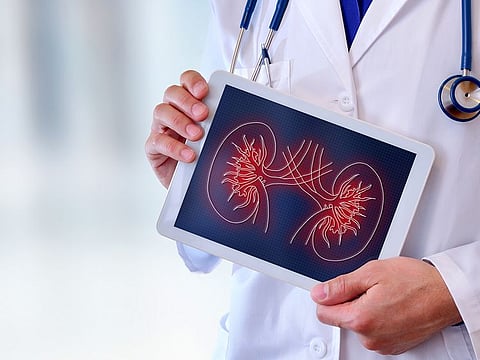Filipina nurse in UAE flags rare life-threatening kidney disease
Timely medical intervention by doctors at RAK Hospital prevents organ failure

Ras Al Khaimah: A 38-year-old Filipina nurse, battling several comorbidities, found herself facing a life-threatening health crisis when she started noticing unusual symptoms—frothy urine and swelling in her legs. The patient, who had a history of diabetes, obesity, and hypertension, initially dismissed these signs, unaware that they were indicators of a rare and aggressive kidney disease. If left untreated, the condition could have led to total kidney failure. Thanks to timely medical intervention at RAK Hospital, her condition was not only managed but successfully treated preventing organ failure.
When the patient arrived at RAK Hospital, Dr. Ajinkya Shivaji Patil, Specialist Nephrologist, immediately suspected something more serious than a routine diabetic complication. Further tests revealed that she was losing a massive amount of protein in her urine, along with blood, and her creatinine levels—an indicator of kidney function—were rising at an alarming rate.
These signs pointed to a severe autoimmune kidney disorder known as Pauci-immune Crescentic Glomerulonephritis, a rare subtype of Rapidly Progressive Glomerulonephritis (RPGN), a condition that can cause kidney failure in a matter of weeks if not diagnosed and treated in time.
Pauci-immune Crescentic Glomerulonephritis is an aggressive form of nephritis that causes severe inflammation and scarring in the kidneys. It is often associated with ANCA-associated vasculitis, an autoimmune condition where the body’s immune system mistakenly attacks its own small blood vessels, including those in the kidneys. The disease is rare, affecting only 10-20 people per million globally each year. Without timely intervention, it can lead to permanent kidney damage, requiring dialysis or even a transplant.
Given the patient’s history of diabetes, hypertension, and obesity, her risk of kidney complications was already high. However, this specific condition was unexpected, requiring immediate intervention to prevent irreversible damage.
Performing a kidney biopsy was critical to confirming the diagnosis, but it wasn’t easy. “Because of her obesity, the kidney was deeper than usual, making the biopsy more challenging,” explained Dr. Patil. “Using ultrasound guidance, we carefully navigated the procedure, ensuring it was painless and complication-free. That biopsy allowed us to immediately start the right treatment, which made all the difference.”
The urgency of this case was further heightened by the rapidly progressive nature of the disease. If treatment had been delayed, the patient could have suffered permanent kidney failure in just a few weeks. Additionally, managing her diabetes while administering immunosuppressive therapy was another challenge, as improper steroid use could worsen blood sugar control. The treatment plan was also tailored to protect her fertility, given her young age and future family aspirations.
Once the diagnosis was confirmed, the patient was immediately started on a carefully tailored immunosuppressive therapy, including Rituximab, a monoclonal antibody that helps regulate the immune system. Given her diabetes, the team at RAK Hospital also carefully adjusted her steroid regimen to avoid complications with blood sugar levels.
Within just a week, her kidney function showed remarkable improvement, with her creatinine levels dropping from 2.5 mg/dl to 1.3 mg/dl within a month—an extraordinary recovery. Her symptoms, including fatigue and swelling, also resolved, and her blood pressure and sugar levels stabilized, indicating a positive response to treatment.
Risk factors and prevention strategies
Pauci-immune Crescentic Glomerulonephritis, like many autoimmune diseases, does not have a well-defined cause but tends to occur in people with a history of autoimmune disorders, infections, or chronic conditions like diabetes. Those at highest risk include young females and elderly males, individuals with pre-existing kidney disease, and those with uncontrolled diabetes or hypertension.
While this condition is rare, there are preventive measures that can reduce the risk of severe kidney damage:
• Early detection: Regular health check-ups, particularly for individuals with diabetes or hypertension, can help detect kidney disease early.
• Managing underlying conditions: Controlling blood sugar, blood pressure, and weight is critical to preventing kidney complications.
• Avoiding nephrotoxic substances: Excessive use of certain painkillers and non-prescribed medications can put undue strain on the kidneys.
• Recognising symptoms early: Signs such as frothy urine, unexplained swelling, or persistent fatigue should never be ignored.
“This case is a powerful reminder that symptoms like frothy urine or swelling should never be ignored,” said Dr. Raza Siddiqui, Executive Director of RAK Hospital. “Kidney diseases often go unnoticed until it’s too late. Our goal at RAK Hospital is to provide advanced diagnostic and treatment options so that patients get the care they need before things become critical.”
RAK Hospital’s expert team, cutting-edge technology, and patient-first approach played a vital role in saving this young woman’s kidneys—and possibly her life. The hospital urges people to take their kidney health seriously, especially those with diabetes or hypertension, and to seek medical attention for any unusual symptoms. Early detection can be the difference between successful treatment and irreversible kidney failure.
Sign up for the Daily Briefing
Get the latest news and updates straight to your inbox


